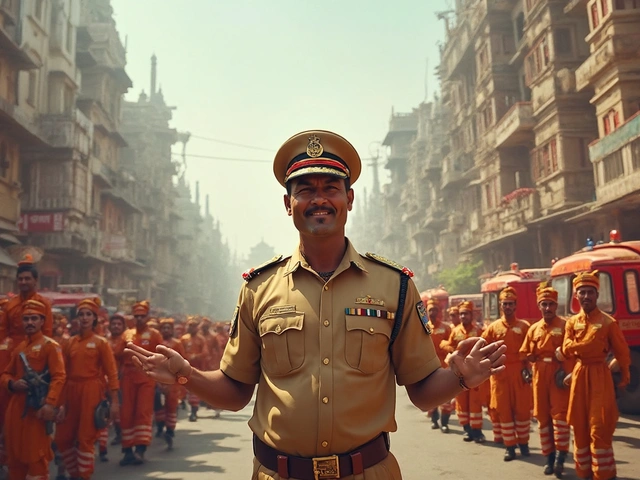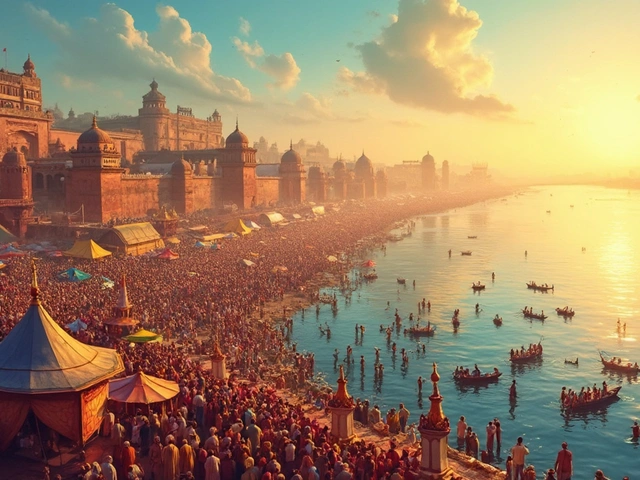Jawaharlal Nehru: The Iconic Leader Born in Allahabad (Now Prayagraj)
Jawaharlal Nehru & Prayagraj Quiz
1. In which year was Jawaharlal Nehru born?
2. What is the current name of the city where Nehru was born?
3. Which famous Indian actor was also born in Prayagraj?
4. Which movement did Nehru NOT directly lead?
5. In what year was the city officially renamed to Prayagraj?
Jawaharlal Nehru is a founding father of modern India and the nation’s first prime minister, born on 14 November 1889 in the historic city of Allahabad, which was renamed Prayagraj in 2018. He grew up amid the political ferment of the British Raj and later steered India through its early years of independence.
Why the Question Matters
People often wonder, “Who was born in Allahabad now known as?” because the city’s name change can obscure its rich heritage. The answer points directly to Nehru, whose life story intertwines with the city’s own transformation from colonial outpost to cultural hub.
Allahabad - The City Behind the Name
Prayagraj (formerly Allahabad) is a major urban centre in the Indian state of Uttar Pradesh, situated at the confluence of the Ganges, Yamuna, and the mythical Saraswati rivers. The city’s strategic location made it a seat of power during the Mughal era, a British administrative hub, and later a crucible for nationalist ideas. Its famed University of Allahabad, founded in 1887, attracted scholars and activists, creating an environment where a young Nehru could absorb liberal ideas and political debate.
Early Life and Family Roots
Born into the affluent Nehru‑Gandhi family, Jawaharlal’s father, Motilal Nehru, was a prominent lawyer and a senior leader of the Indian National Congress, the party that spearheaded the fight for independence. The family’s residence, Anand Bhavan, served as a meeting place for freedom fighters, including Mahatma Gandhi, whose philosophy of non‑violent civil disobedience profoundly shaped Nehru’s political outlook.
Political Rise Under the British Raj
After completing his education at Harrow and Cambridge, Nehru returned to India in 1912 and quickly entered the political arena. As a member of the Indian National Congress, he participated in major movements such as the Non‑Cooperation Movement (1920‑22) and the Civil Disobedience Movement (1930‑34). His speeches, broadcast from the rickety stages of Prayagraj’s public squares, rallied crowds and cemented his reputation as a charismatic orator.
First Prime Minister of Independent India
When India’s Constitution came into force on 26 January 1950, Nehru was sworn in as the nation’s inaugural prime minister in New Delhi, the capital city designed as a symbol of a new democratic India. His tenure (1947‑64) focused on industrialization, secularism, and scientific advancement. Programs like the Five‑Year Plans, the establishment of the Indian Institutes of Technology (IITs), and the Non‑Aligned Movement (NAM) reflected his vision of a self‑reliant, globally engaged India.
Legacy: Nehruvian Ideals That Still Echo
Today, the term Nehruvian socialism refers to a blend of state‑led industrial growth and a commitment to social justice. Though critics argue that some policies slowed private entrepreneurship, many credit Nehru with laying the groundwork for India’s later economic boom.
Other Famous Personalities Born in Prayagraj
| Person | Birth Year | Profession | Key Achievement |
|---|---|---|---|
| Jawaharlal Nehru | 1889 | Politician | First Prime Minister of India |
| Amitabh Bachchan | 1942 | Actor | Iconic Bollywood star with over 200 films |
| Harivansh Rai Bachchan | 1907 | Poet | Author of the beloved poem ‘Madhushala’ |
| Vijay Kumar Singh | 1950 | Scientist | Pioneer of Indian space research |
These individuals illustrate the city’s diverse contribution to politics, arts, literature, and science. While Nehru shaped the nation’s destiny, Amitabh Bachchan brought Indian cinema to global screens, and Harivansh Rai Bachchan enriched Hindi literature.
Connected Concepts Worth Exploring
- Indian Independence Movement - the decades‑long struggle that culminated in 1947.
- Secularism in India - a principle Nehru championed in his speeches and policies.
- Non‑Aligned Movement - the coalition of newly independent nations that sought a middle path during the Cold War.
- Educational reforms - the establishment of institutions like the IITs that continue to drive innovation.
- Urban development of Prayagraj - how the city’s heritage shapes its modern infrastructure.
Delving into any of these topics deepens the understanding of why Nehru’s birthplace matters beyond a simple trivia fact.
Key Takeaways
- Jawaharlal Nehru, India’s first prime minister, was born in Allahabad, now Prayagraj.
- The city’s cultural and educational climate nurtured his early political consciousness.
- Nehru’s policies laid the foundation for India’s democratic and scientific institutions.
- Prayagraj has produced a range of notable figures across different fields.
- Exploring related themes-like the Indian independence movement and secularism-offers richer context.
Frequently Asked Questions
When was Jawaharlal Nehru born?
He was born on 14 November 1889 in Allahabad (now Prayagraj), Uttar Pradesh, India.
What was the original name of Prayagraj?
The city was officially called Allahabad until the Uttar Pradesh government renamed it Prayagraj in 2018 to reflect its ancient status as the confluence (Sangam) of the Ganges, Yamuna, and Saraswati rivers.
How did Nehru’s upbringing in Allahabad influence his politics?
Growing up in a politically active household near the University of Allahabad exposed him to liberal ideas, nationalist debates, and leaders like Gandhi. The city’s intellectual climate nurtured his belief in democracy, secularism, and scientific progress.
Which other famous personalities were born in Prayagraj?
Notable births include actor Amitabh Bachchan (1942), poet Harivansh Rai Bachchan (1907), and several scholars and scientists who have contributed to Indian arts, literature, and space research.
What were Nehru’s major achievements as prime minister?
He oversaw the adoption of the Constitution, launched the first Five‑Year Plans, established institutions like IITs and AIIMS, promoted a mixed economy, and helped found the Non‑Aligned Movement, positioning India as a leader among newly independent nations.
Why is the name change from Allahabad to Prayagraj significant?
The change reflects an effort to revive the city’s ancient religious identity tied to the sacred Sangam, while also sparking debates about heritage, politics, and regional identity in contemporary India.




